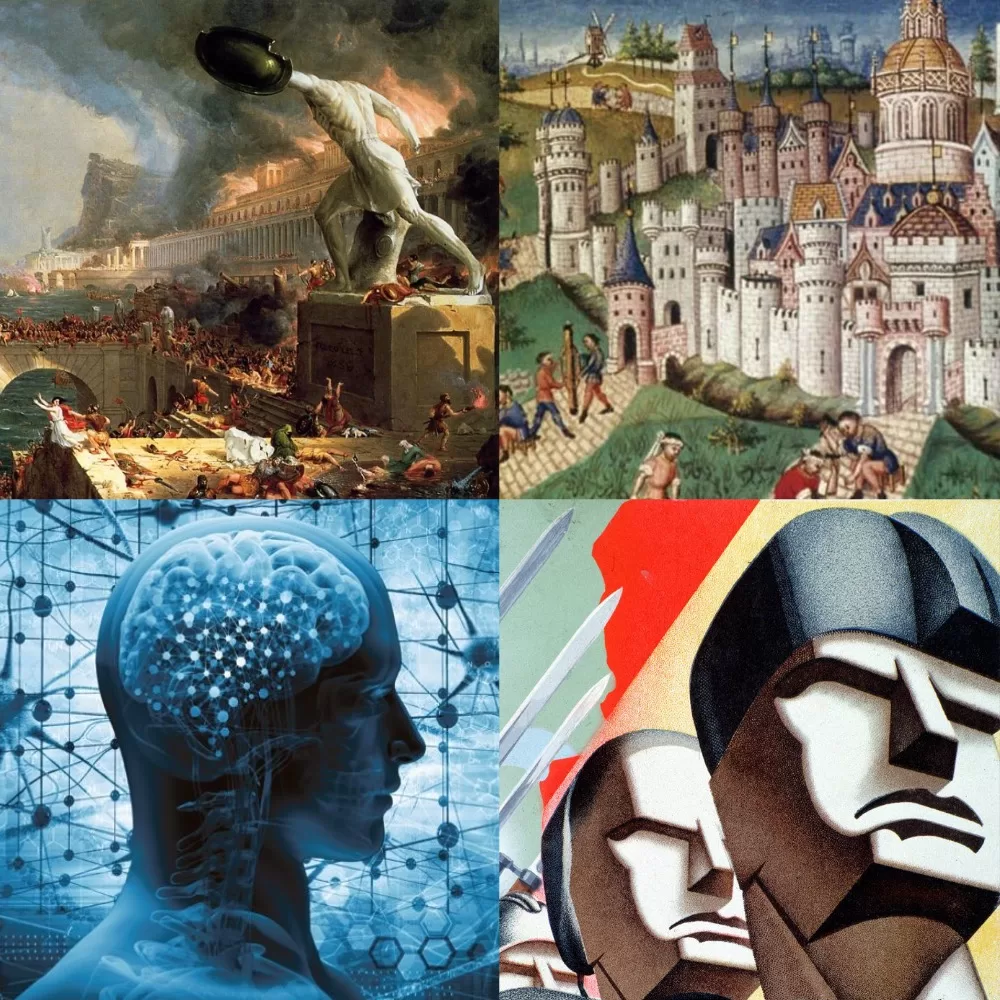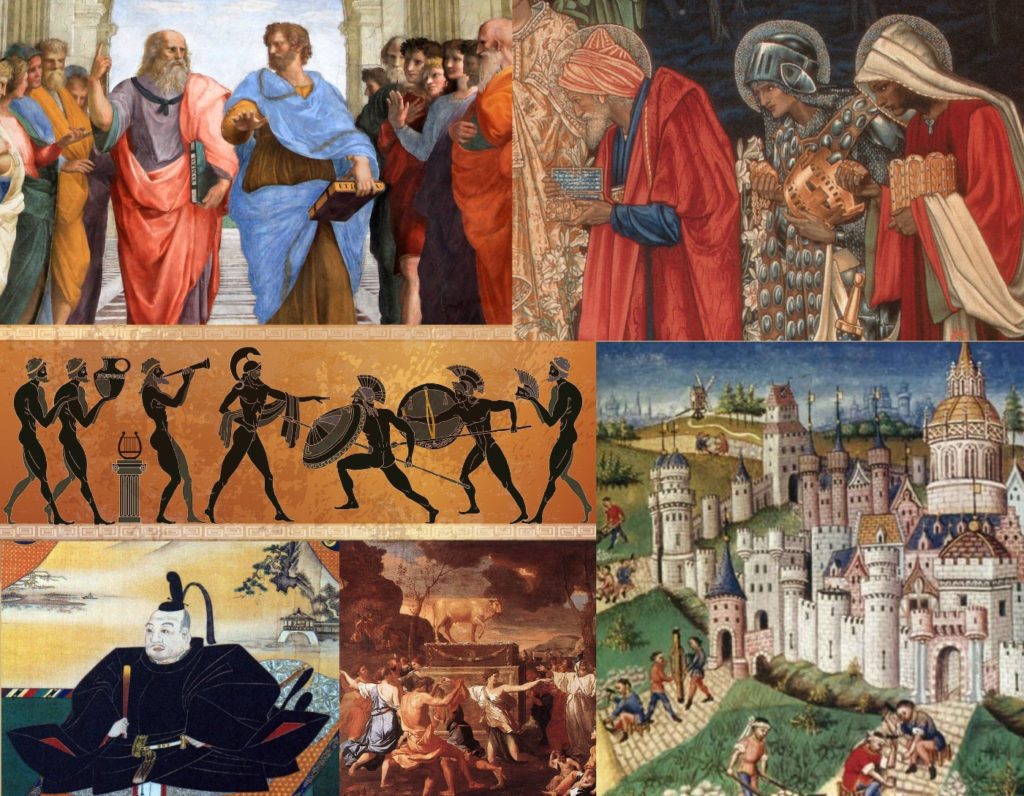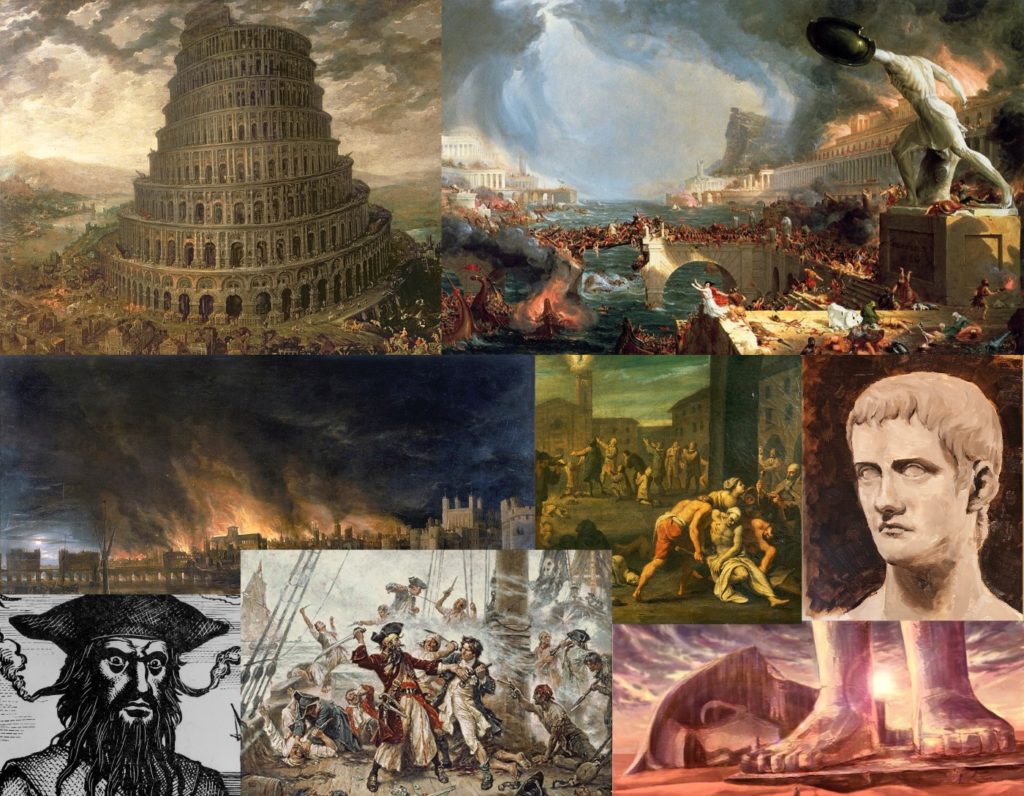
Fantasy and science fiction is filled with civilizations of various traditions and styles of rule. Whether small or large, understanding these societies is key to create immersive realms of fiction! Today, we discuss some of the less common, and sometimes stranger types of government!
Welcome back, friends!
If you read through my last article about the more common types of government, we’ve covered a lot of examples of how societies are shaped by their style of rule, in fiction and reality!
Let’s continue our journey, and wrap up this list of 36 Types of Government, proceeding with the final eighteen.
If you’ve stumbled upon this article from the vast sea of the Internet, I’d recommend reading my first entry: Worldbuilding: 36 Types of Government (Part 1)
Evolution of society. Evolution of rule!
If history teaches us one thing, it’s this: Societies evolve.
Hunter-gatherers mastered the wilderness. As agriculture became a way of sustainable food, villages formed. Each community that grew chose their own laws and traditions. Over time, they bound together, established trade, feuded, built great structures, and taught each other how to prosper in an unrelenting world.
Nations came into being. As they established identities and cultures, worlds would eventually clash. Over wars, famine, pestilence, and rebirth, a cycle repeats and builds upon the ruins of old. Stones upon stones. In the spirit of revolution, new governments formed. New ideas built upon the old. Human experience advanced to one between nations, a world of intricate relationships and roles. Their progress synchronized with their technology, philosophy, industry, warfare, struggle for rights, and growing public involvement.
When you look at a culture from past to present, you see how these paths formed, informing us how people grow, change, and intermingle. This is why I love history! It tells us everything about how societies function, then and now. Its fascinating seeing old ideas morph into the new. Yet, sometimes, old ideas are reforged into something quite the same.
Context and Disclaimers
After taking the common government forms and providing them in my first article, I realized that I had a bin filled with governments that didn’t fit the same mold. Many were stranger oligarchies, or “states” that I wanted to share, but didn’t have room for. I figured that these needed a more flexible, ambiguous way of organizing.
As I list out the next eighteen types of government, I’ve chosen these categories:
• Traditional, forms discovered in times from ancient to before the enlightenment.
• Non-traditional, a group of modern, futuristic, and theoretical systems.
• Decadent, since not all progress is an upward slope, and atrophy is a part of that experience.
Since this is the last eighteen, this is even more of an imperfect list than the first. None of these systems are limited by these categories. You may see something “traditional” in modern or future context. A non-traditional system might be seen as a bright path, something promising and enlightening, irrelevant to your worldview, or maybe even old news altogether. Something I listed as ‘decadent’ might based upon an certain lens or interpretation, or might not even qualify as a type.
All of these are short, and not thoroughly contextualized. My intent since the beginning was to provide a glimpse of each of them. They serve as a ‘jumping off’ point for your own study and investigation.
My goal this context is to teach, and inspire you with some ideas on how to approach your world-building journey!

A NOTE from myself: Greetings friends! Thank you for viewing this content. Running a website can be expensive, and we’re not particularly fans of ads. If you could, consider becoming a Site Supporter, and donating via Ko-Fi! … Big thanks!
Enough talk! Let’s get at it.

Traditional Forms
Feudalism – Rule of Lords and Kings – “All according to their station”
A social system in which the nobility hold land from a king in exchange for military service. Down the chain, commoners (peasants/serfs) lived on their lord’s land in service to them. Peasants were provided military protection, and obligated to perform labor, provide a share of the produce, and pay homage. This relationship between lord and peasant is also referred to as Manorialism.
In short, society was structured around the holding of land in exchange for service and labor. During the enlightenment, this way of living came into challenge by revolutions and evolving political theory. At the same time, many critics suggest that the economic system of today still shares similarity to feudalism.
Most medieval fantasy fiction sets place in a vaguely feudal society, but some are more historically accurate than others.
- REAL: Medieval Europe, Asia, and the Middle East
- FICTION: Westeros (Game of Thrones), Nottingham (Robin Hood), Feredlen (Dragon Age: Origins)
Kritarchy – Rule by Judgement– “We are the law”
A form of government dependent on judges. This is a traditional system based on customary law, rather that statutory law. This means rather relying on independent written laws, the law is passed by oral tradition, and open to the interpretation. While a majority of citizens might broadly agree on those laws, it is up to the judges to rule upon those laws.
This grants a broad sense of freedom since there are no concrete statutes to follow (like taxation). However, depending on the customs, the law may still require obligations from its citizens. Also, judges may be considered the ruling class, absent of any judgement upon themselves, or may not be any different from citizens, adhering to the same laws.
- REAL: Somalia, Ancient Israel (Old Testament), Ancient Ireland (Druids), Frisia
- FICTION: Mega-City One (Judge Dredd)
Tribalism – Rule by Small Groups – “Birds of a feather”
A state, or lifestyle organized into tribes, clans, or small groups of individuals within a closed network, often sharing a cultural identity. Loyalty to the social group is key to membership, and its customs dictate the rules of the tribe. Tribes may function as small governments within a larger one, or within an environment away from government, either as part of a hermitage or coven of privacy.
Tribes may also refer to the conformity between groups of people. This “way of being” may refer to those of similar occupations or habits. However, any closed circle in tribalism means limited contact with the outside, resulting in limited education and understanding of the broader world.
- REAL: Tribes of Israel, Souix, Cherokee, Bedouin, Masai, Ainus, Zulu
- FICTION: The Wildlings (Game of Thrones), Dúnedain Rangers (Lord of the Rings), Southern Water Tribe (Avatar: The Last Airbender)
Timocracy – Rule of the Honorable– “Veni, vedi, vici”
This is a war-like and honor-bound society where only those who possess land may participate in the government, and the ambition for honor, power, and military glory motivates the rulers. Civic honor and political power increases with the amount of property one owns. It is an oligarchy which is not strictly defined by the “inheritance” of an aristocracy, or the “absolute wealth” of a plutocracy (although often times, can become one of these two forms). You may imagine a society which is run by “houses”, regardless of whether they are noble, gained by wealth, or obtained deeds of “honor”, such as efforts in a military campaign. All other citizens are laborers, and exempt from making decisions.
Intellectuals are discouraged from office, as the love for honor is greater than reason. It prefers simpler characters with plenty of spirit, better suited for war than peace.
- REAL: Sparta, Athens, Chivalry of the Middle Ages, Samurai
- FICTION: Klingons (Star Trek), Nords (The Elder Scrolls)
Gerontocracy – Rule of the Old – “The Elders are Watching”
A system where society is ruled by the elders, or eldest. Some forms are habitual, meaning that it’s leaders tend towards the elder age group, while others are mandated, requiring a minimum age to qualify. It is common to find gerontocracies in cultures that value experience and wisdom as paramount, such as in theocracies.
While traditional, it can take a more modern or futuristic spin. A system that generally honors the old over the new can fit this bill. This form can be seen throughout history, but in fiction, can also exist in dystopian societies where lifespans are increased for the few, and kept short for the many. The most extreme fictional example might see immortals as the few, and mortals as the many.
- REAL: Sparta (The Gerousia), The Vatican, Saudi Arabia, Roman Senate
- FICTION: Various Vampire Novels, Capitol (The Worthing Saga)
Diarchy / Triumvirate – Rule by Two or Three – “Together, we shall rule”
A diarchy is a government characterized by “co-rule” between two individuals of equal or competing power. Rulers can either be of the same status (two kings, queens), or be of separate rank where their powers are separated (king and a religious leader). A lawful diarchy may hold this system as a tradition that survives through generations, and relies solely on mutual co-operation. However, a “de facto” diarchy might mean that both rulers are actively contesting each-other for supreme rule.
A government ruled by three entities is referred to as a Triumvirate. While less common than a diarchy, the separation of powers allow for more executive decision-making within a consolidated power structure.
- REAL: Roman Republic (Two Consuls, First Triumvirate), Japan (Shogunate), British India, Andorra,
- FICTION: King + High Sparrow (Game of Thrones), Ynnead (Warhammer), Darth Vader + Emperor (Star Wars),

Non-Traditional Forms
Socialism – Rule for Public, not Private – “Redistribution of wealth”
Not a government itself, but a set of policies aimed towards the redistribution of resources to the public, as opposed to private individuals. This often comes as a response to societies which wealth and privilege is tilted too far toward a single group of people, and promotes the flow of resources to the broader populace. The spectrum of leftist formats vary, but they all share an opposition against imperialist power structures and economics, and a support of collectivism.
Socialist and leftist societies are most likely to be seen in sci-fi, since fantasy is often rife with feudal, imperial, or oligarchical governments that are pre-industrial.
- REAL: Takes various forms, ranging from democratic (Denmark, Norway) to libertarian (Anarcho-Syndicalist movement), and authoritarian (China, USSR).
- FICTION: KSR’s Mars Trilogy, The Star Fraction,
Technocracy – Rule by the Skilled – “The Machine of Society”
A government which elevates the talented, skilled, and intelligent into positions of authority. It idealizes the state as a machine, and professes that scientists, engineers, and the highly educated are best to rule, while the rest remained as workers in a class characterized by job specialization and rationed resources.
A technocratic society is one that advocates for scientific method over superstition or religion. These states are referred to as “technates”. These experts are often appointed, rather than elected.
- REAL: Singapore, USSR (Leonid Brezhnev), Movement in the US during the Great Depression (1930’s)
- FICTION: The Institute (Fallout 4)
Cyberocracy – Rule by AI – “My Logic is Undeniable”
A government that rules by the effective use of information. This system is centered on a complex method of communication (such as inter-connected computer networks) that directly pairs problems with their solvers. The purpose is to address the flaws of “bureaucracy” altogether, which can be a source of corruption, inefficiency, and small power struggles that detract from the solving of problems. Human beings making the decisions create countless inefficiencies which an super-intelligent network, or A.I. system can excel at.
This automated form of government is theoretical, as there have been no actual cyberocracies to date. However, such a system could open the door to new forms of democracy, oligarchy, or authoritariansim. This can assist human progress, or hinder it. The risk of a “rogue AI” or “singularity event” is also a factor.
- REAL: No governments to date.
- FICTION: Neuromancer, The Matrix, I,Robot, Skynet (Terminator), Portal
Stratocracy – Rule by the Enlisted – “We Few, We Band of Brothers/Sisters”
A government ran by chiefs of the military, centered on jurisdictional legalism, carried out by enlisted officers. Unlike a military dictatorship or junta, this is a stable government with full administrative, judicial, and legislative processes. All of these are supported by the law, constitution, and the society as a whole.
Interestingly, this system does not necessarily need to be autocratic or oligarchic. However, it is centered on military service as a precursor to citizenship, and that citizenship is required to elect or govern.
- REAL: Myanmar (1997-2011), Roman Empire (Punic Wars), Ancient Sparta, The Cossacks
- FICTION: Cardassian Union (Star Trek), Galactic Empire (Star Wars), Terran Federation (Starship Troopers), Amestris (Fullmetal Alchemist), Earth Nation (Avatar, the Last Airbender)
Geniocracy – Rule by the Intelligent – “Knowledge is power, literally.”
This government places the very intelligent at the top of the ruling class. Among these would be scientists, sociologists, and geniuses of high IP (Intellectual Potential), regardless of race or social class. Mandated tests would be taken to ascertain the IP of the populace, placing the top 20% as the electorate, and the top 0.5% as the electable.
The mission of such a society is focused on a one-world government, eradicating violence, emphasizing fulfillment of the genii, and saving humanity from itself. However, while addressing the challenge of intelligence and a basis of scientific thinking, it values raw intelligence over practical-use intelligence, and also does not address ethics in scientific progress or leadership, which could result in IP-driven classism, persecution, or even eugenics.
- REAL: No government, but high-IQ organizations like Mensa International do exist.
- FICTION: World State (Brave New World)
Noocracy – Rule by the Mind – “Infinity, ahead and behind.”
A social or political system ruled by an “aristocracy of the wise”, a caste of philosopher kings. This society heralds shared wisdom, based on the priority of human mind. This differs from a geniocracy by not valuing raw intelligence, but the practical and political intelligence to steer humanity through the turbulent waters of the future and into a new golden age.
However, this thinking is directly opposed to democracy, which is considered a system of irrational (and emotional) consensus. Instead, it presumes citizens to not have the knowledge necessary to achieve their aims, and otherwise do not know any better. No elected politicians. Its best to let the wizened experts assume control.
This idea is seen in science fiction more than fantasy. This idea can take multiple forms, such as a non-fundamentalist theocracy, a technocracy that emphasizes experience and awareness over talent, a collective of mind-linked brains, or an extra-terrestrial entity whose mission is to guide humanity.
- REAL: Purely theoretical.
- FICTION: The Traveler (Destiny Series), Helios (Deus Ex)
Demarchy – Rule by Lottery – “Pick a card. Any card.”
Also referred to as “Sortition”, this is a unique kind of democracy which is based on random lottery. Not everyone has power, but everyone is eligible to be selected. In some variations, this is administered as a direct democracy, taking random poll from a populace. In others, it is less democratic, the eligible belonging to a specific class or status, or are gathered to vote representatives rather than engage in direct policy making.
This form has been preferred in situations when only a small voting body is needed, and there is intense desire to combat aristocracy, or avoid corruption, favoritism, or bribery. However, being that it is random, there is a chance as always to either have less than desirable effects, or it be used to obscure bribery or corruption further by “adjusting” the chance of a certain group being picked.
- REAL: Legal systems, and law court juries (Jury Duty), Italian City States (Great Councils)
- FICTION: The Demarchy (Revelation Space), Thalassa (Songs of Distant Earth), Martian Lower House (Blue Mars)
Magocracy – Rule by Mages– “Expelliarmus“
An oligarchical organization ruled by the most prominent of mages and spell-casters. This society holds those of magical ability as higher birth and higher privilege, either alongside other aristocracy, or over the mundane altogether. In some cases, only those who can wield magic have a voice in government. One is most likely to see a magocracy at work alongside academies, magical schools, or societies which are ruled by powerful wizards.
The society may rely on the type of magic which is most prominent. Mastery in divine magic may be treated similar to a theocracy, where arcane prowess might see parallels to a geniocracy. Mundane citizens may be lowly regarded or persecuted.
Naturally, this is a fantastical sort of government, so no real-world examples exist.
- FICTION: Ministry of Magic (Harry Potter), Tevinter Imperium (Dragon Age), Merilon (Darksword Trilogy)


Decadent Forms
Despotism / Tyrrany – Rule by Cruelty – “Crush your enemies.”
Typically characterizing the crueler nature of a authoritarian government, a tyranny is a state that oppresses its citizens. This can be by depriving freedoms, opportunities, welfare, resources, or things essential to life and prosperity. This can also include acts of violence, destruction, or torture.
Despotism refers to governments ruled by a single supreme entity, often known for their brutality and cruelty. This entity is most often a person, but can depict a group, party, faction, organization that flexes their power with disregard to human life.
You may often see tyrannical regimes or despotic rulers target or neglect a people, or groups of people within their realm.
- REAL: Nazi Germany (Hitler), Roman Empire (Caligula), Oliver Cromwell, Ivan the Terrible, Vlad the Impaler
- FICTION: Lord Ruler (Mistborn: The Final Empire), Sauron (Lord of the Rings), Thanos (Marvel Comics)
Kleptocracy – Rule of Thieves – “Two for me, none for you.”
A system that is either ruled by thieves, or is stooped in (or encourages) thievery. Conspiracy, theft, and corruption is at the epicenter of government, and its victors are those who overcome the banditry and scheming come out on top. Naturally, depending on whether the environment is within a known den of thievery, or amongst the daylight, thieves may or may not admit to such a thing, so it is rare to see a “Kleptocracy” out in the open. Secrecy and information is of the highest of value to an individuals prosperity and survival. Coin in the right hands, words in the right ear, and a knife in the right pocket can be the difference between life and death.
This term is also thrown around as a way to describe a system overwhelmed with corruption, which would function as any other government if it wasn’t for the overwhelming incentive to lie, cheat, and steal.
- REAL: Gangs, guilds, and pirates. Otherwise, no state willingly calls itself a Kleptocracy.
- FICTION: Tortuga (Pirates of the Caribbean)
Fragile State – Rule Coming Undone– “My kingdom for a horse.”
A failed state (or fragile state) is defined as one that has disintegrated to the point where the basic conditions and responsibilities of a government no longer function properly. Various metrics are used to judge whether a state is failing, fragile, or failed. The following are signs of a failing state:
- Loss of legitimate authority to make unified decisions
- Loss of control of territory, or recognition of sovereignty
- Inability to provide public services or enforce laws
- Inability to interact as a full member of the international community.
- Decline of human rights, economy, security, public health, and sovereignty
When in this position, either the state that was will fracture, will devolve into mob rule, will be susceptible to foreign influence or conquering, or will over time and through suffering transition into a system that allows it recover. Recovery requires state development, which can come from either nation-building, war-making, or foreign aid.
- REAL: Western Roman Empire, Mayan Civilization, French Monarchy (pre-revolution), Weimar Republic (1930s), East Germany (Cold War), Late USSR, Yugoslavia
- FICTION: Kings Landing/Mad King (Game of Thrones), Adro Monarchy (Powder Mage Trilogy)
Cyclical Bureaucracy – Rule by Paperwork – “Let me check with my superior.”
A satirical sort of government that I invented one rainy day in my high school years. Inspired by the goblins of Harry Potter, and the Vogons of Hitchhikers Guide to the Galaxy, the idea of a massive bureaucracy consisting of 3000+ members where all acts of rule require the proper form. All forms are drafted, and then must be approved by the drafters superior. The superior must review and submit it to their superior. Forms eventually round the entire hierarchy of superiors until it reaches the last person, of whom the original drafter is the superior of. The cycle continues forever, until the timeline for submitting expires, or the conditions for Special Provision X is reached. …
Nobody knows the conditions for Special Provision X.
And here we are! The final eighteen of thirty-six.
I’ll confess, that last one is a joke, but I figured I’d end it with a lighter note. Not every form of government is purely a serious affair, and satire is part of the experience of learning how they function, and how they don’t.
Going through this list was quite the educational and entertaining experience, and if you enjoyed these articles, or learned something new, I’d be happy to hear about it!
Thank you for reading! If you have any questions, or suggestions, feel free to reach out!
Worldbuilders, writers, and storytellers assemble! … Matthew has some other articles he’d like to share that you might find interesting. Check out some of the other pieces, and stay tuned for more content!
- Axolotls, Genies, and Kaiju; a Quick TTRPG Zine Roundup #2 - May 19, 2025
- d100 City Encounters and Urban Sidequests - April 26, 2025
- Dirtbags! a Sci-Fi Shooter RPG: Gameplay Review! - March 23, 2025


